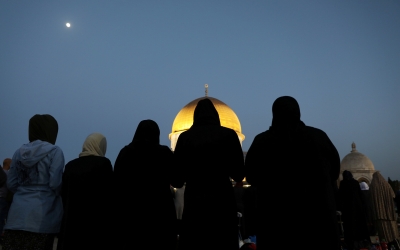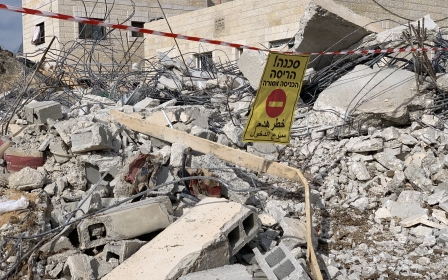Israel issues eviction and demolition orders to Palestinians in East Jerusalem

Israeli authorities in occupied East Jerusalem delivered eviction orders to some 30 Palestinian homes on Monday in several neighbourhoods, official Palestinian Authority news agency Wafa reported.
All the eviction orders were delivered between Sunday and Monday, notably calling for the evacuation of 22 houses in the Old City neighbourhood of Bab al-Silsila - or Chain Gate - leaving almost 200 members of 22 Palestinian families without a home.
The houses, located on the path towards the Al-Aqsa Mosque compound, had cracks in the walls due to Israeli archaeological excavations under the Old City, a practice that has affected the solidity of a number of homes in Jerusalem.
Faiza Abu Asab, one of the residents of Bab al-Silsila, told Middle East Eye that Israeli excavation made the houses “unliveable”, as some sections of walls had collapsed or bore large cracks.
Abu Asab said residents were concerned that their homes might be seized by Israelis, as part of a policy known as "Judaisation"- seeking to erase the Palestinian presence from Jerusalem.
New MEE newsletter: Jerusalem Dispatch
Sign up to get the latest insights and analysis on Israel-Palestine, alongside Turkey Unpacked and other MEE newsletters
“We have been living here for years, and we will remain steadfast in the house and will not leave it even if it collapses on our heads,” Abu Asab said.
Family loses home to settler group
Meanwhile, Israel's Jerusalem magistrate court ruled on Sunday to evict 16 members of the Rajabi family from their three-apartment building in the neighbourhood of Batn al-Hawa - a decision that will affect children, elderly, and persons with disabilities.
The three-story building belonging to Nasser al-Rajabi will be handed to the Israeli settler group of Ateret Cohanim.
Ateret Cohanim has launched dozens of lawsuits against some 100 Palestinian families living in Batn al-Hawa, putting 700 people at risk of eviction, according to Israeli human rights group Peace Now.

Batn al-Hawa lies south of the Old City near the neighbourhoods of Silwan and Wadi al-Hilweh, which have also been targeted by settler groups seeking to expropriate Palestinian residents and carry out archaeological excavations under Palestinian houses.
“Some 14 Palestinian families have already been evacuated from Batn al-Hawa, and nearly 100 more families are facing court proceedings in eviction cases,” Peace Now said in a statement.
Meanwhile, Israeli NGO Ir Amim warned in a statement that "if Ateret Cohanim is successful, Batn al-Hawa is anticipated to become the largest settlement compound in a Palestinian neighborhood in the Old City Basin, with the outcome of significantly tightening the emerging ring of state-sponsored settlement activity around the Old City and severely undermining the possibility of a future two-state solution in Jerusalem".
Rajabi told MEE that he had been fighting his family's eviction case for the last four years, adding that another 88 houses were also at risk of eviction in the area.
“By what right do they come and ask us to leave and claim that this land is theirs?" Rajabi said. "Israeli police and intelligence always harass us and we have been fined every time we refurbished the houses or added a room to it.”
Israeli settlers base their claims on a 1970 Israeli law ruling that land owned by Jews prior to the establishment of the state of Israel in 1948 should be restituted to its original owners and descendants. The legislation does not apply to Palestinians.
In Batn al-Hawa, Ateret Cohanim says the land was allocated to a Jewish trust to benefit the Yemenite Jewish community in 19th century in Jerusalem - arguing that Palestinians who built their homes legally in the neighbourhood after 1948 should be evicted in order to return the land.
"In the same city, as a result of the same war, two populations lost properties but only one is entitled to repair the historical injustice and return to its property, while the second, which sometimes lives a few hundred metres from its properties, cannot return [to] them," Peace Now said in its statement.
In July, Israeli police evicted a single mother and her four children from their home in the neighbourhood of Silwan in order to hand it to the Elad settler organisation.
Spate of demolition orders
Meanwhile, another set of orders was delivered to demolish four houses in Wadi Hummus. In the neighbourhood of Issawiya, several residents received demolition notifications, asking them to demolish their own houses or they would have to pay the costs if Israeli authorities carried out the demolitions.
Wadi Hummus, a neighbourhood in the village of Sur Bahir, has a peculiar administrative situation in that it lies across Areas A, B and C of the West Bank – the first two of which are administered by the Palestinian Authority (PA), the latter by the Israeli military according to the Oslo Accords of 1993.
Despite being part of the West Bank, Wadi Hummus lies on the Jerusalem side of Israel’s illegal separation barrier, meaning its inhabitants have far more access to the city than Palestinians on the other side of the wall - while also effectively living under direct Israeli control.
In July, ten houses were demolished in Wadi Hummus, setting a dangerous precedent for Palestinian properties in Area A.
According to the Oslo Accords, Israel has no say on whether homes should be built in Areas A and B. However, a 2011 Israeli military ruling decreed that Israel could now demolish buildings in PA-administered areas - and Wadi Hummus has been the first to experience the change.
This article is available in French on Middle East Eye French edition.
Middle East Eye delivers independent and unrivalled coverage and analysis of the Middle East, North Africa and beyond. To learn more about republishing this content and the associated fees, please fill out this form. More about MEE can be found here.





